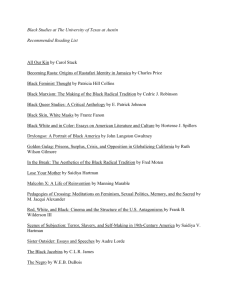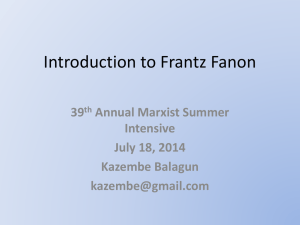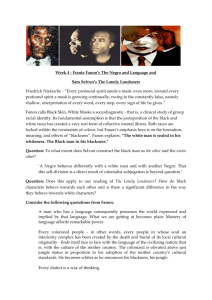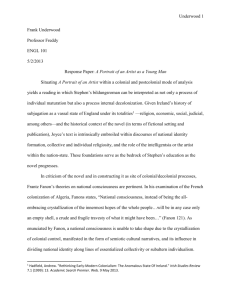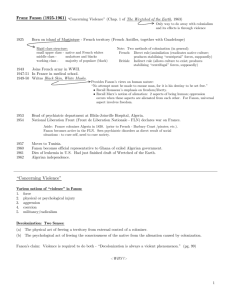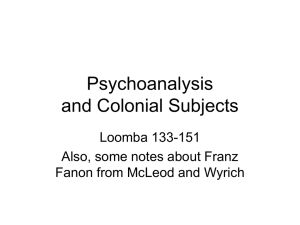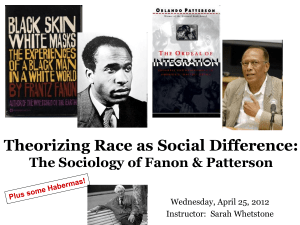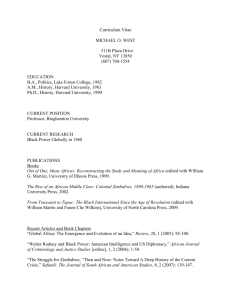Fanon and Land Continued
advertisement
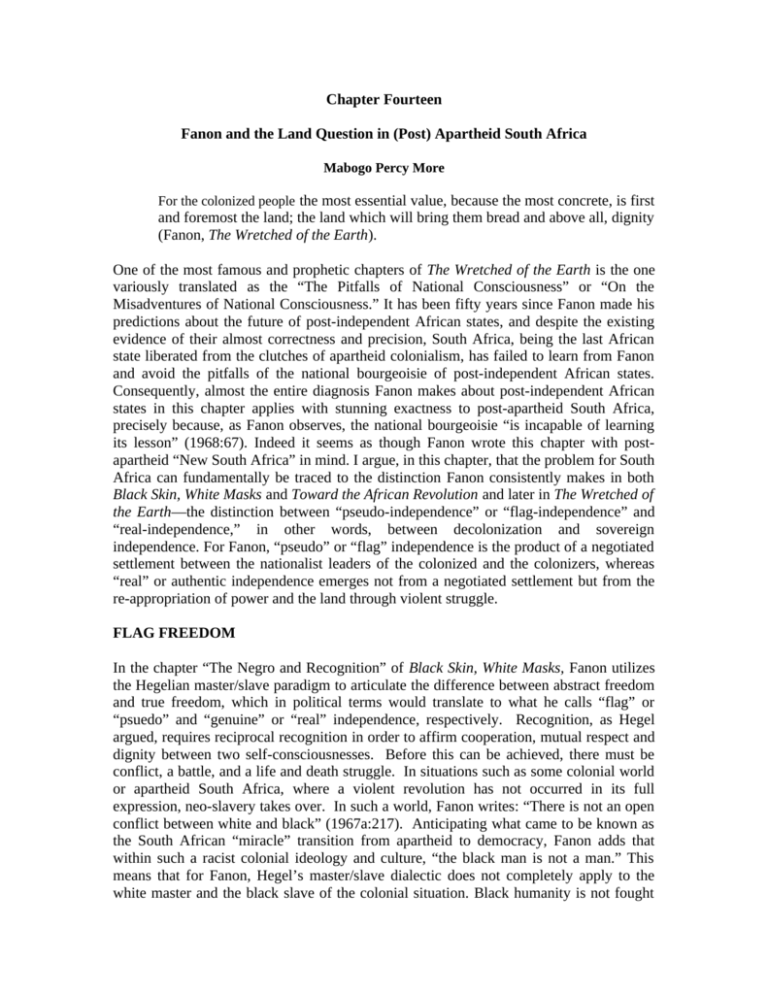
Chapter Fourteen Fanon and the Land Question in (Post) Apartheid South Africa Mabogo Percy More For the colonized people the most essential value, because the most concrete, is first and foremost the land; the land which will bring them bread and above all, dignity (Fanon, The Wretched of the Earth). One of the most famous and prophetic chapters of The Wretched of the Earth is the one variously translated as the “The Pitfalls of National Consciousness” or “On the Misadventures of National Consciousness.” It has been fifty years since Fanon made his predictions about the future of post-independent African states, and despite the existing evidence of their almost correctness and precision, South Africa, being the last African state liberated from the clutches of apartheid colonialism, has failed to learn from Fanon and avoid the pitfalls of the national bourgeoisie of post-independent African states. Consequently, almost the entire diagnosis Fanon makes about post-independent African states in this chapter applies with stunning exactness to post-apartheid South Africa, precisely because, as Fanon observes, the national bourgeoisie “is incapable of learning its lesson” (1968:67). Indeed it seems as though Fanon wrote this chapter with postapartheid “New South Africa” in mind. I argue, in this chapter, that the problem for South Africa can fundamentally be traced to the distinction Fanon consistently makes in both Black Skin, White Masks and Toward the African Revolution and later in The Wretched of the Earth—the distinction between “pseudo-independence” or “flag-independence” and “real-independence,” in other words, between decolonization and sovereign independence. For Fanon, “pseudo” or “flag” independence is the product of a negotiated settlement between the nationalist leaders of the colonized and the colonizers, whereas “real” or authentic independence emerges not from a negotiated settlement but from the re-appropriation of power and the land through violent struggle. FLAG FREEDOM In the chapter “The Negro and Recognition” of Black Skin, White Masks, Fanon utilizes the Hegelian master/slave paradigm to articulate the difference between abstract freedom and true freedom, which in political terms would translate to what he calls “flag” or “psuedo” and “genuine” or “real” independence, respectively. Recognition, as Hegel argued, requires reciprocal recognition in order to affirm cooperation, mutual respect and dignity between two self-consciousnesses. Before this can be achieved, there must be conflict, a battle, and a life and death struggle. In situations such as some colonial world or apartheid South Africa, where a violent revolution has not occurred in its full expression, neo-slavery takes over. In such a world, Fanon writes: “There is not an open conflict between white and black” (1967a:217). Anticipating what came to be known as the South African “miracle” transition from apartheid to democracy, Fanon adds that within such a racist colonial ideology and culture, “the black man is not a man.” This means that for Fanon, Hegel’s master/slave dialectic does not completely apply to the white master and the black slave of the colonial situation. Black humanity is not fought for by the black person but is conferred upon him/her through the mercy and generosity of the white master. As Fanon puts it: “One day the white master, without conflict, recognized the Negro slave” (1967a:217). In a situation where recognition is given without conflict, the master’s recognition amounts to nothing more than a simple gesture, for it still leaves the slave in bondage, albeit being upgraded to the status of a human being. The gift of humanhood without a struggle still constitutes the slave as a slave since he/she has not attained independent self-consciousness and thus remains dominated by the master. During a serious meeting of the masters, one of them, Fanon supposes, courageously says to his peers: “Let’s be nice to the niggers” (1967a:220). After a lengthy argument the other masters finally “decided to promote the machine-animal men to the supreme rank of men” (1967a:220). Through the very fact that the masters “decided to promote,” that is, made a concession to the Negroes, they invariably continued to retain their superiority and masterhood by other means. This decision, Fanon declares, is then followed by a legal declaration of emancipation, a proclamation of independence. In his capacity qua master, the white master declares to the black person, “From now on you are free” (1967a:220). The news of liberty causes a stir of jubilation among the slaves. But this occurrence, this development, this freedom emerges from without and not from within the slave. External liberation, Fanon argues, in no way leads to genuine liberation. The slave has been acted upon rather than acting: The upheaval reached the Negroes from without. The black man was acted upon. Values that had been created by his actions, values that had not been born of the systolic tide of his blood, danced in a hued whirl round him. The upheaval did not make a difference in the Negro. He went from one way of life to another, but not from one life to another (1967a:220). The resonance of these predictive insights with the events immediately prior to and after Nelson Mandela’s release from Victor Verster Prison twenty years ago from now is stunning in many respects. Indeed, pressured by internal and external demands and resistance, the apartheid regime decided to recognize the Black person, “to promote the machine-animal men to the supreme rank of men.” Just as Fanon imagined, the reaction of the other masters to the suggestion of being “nice to the niggers,” when de Klerk presented his negotiation settlement plan with the ANC to his cabinet for ratification, was that of outrage. It is reported that one incensed Minister shouted at de Klerk: “What have you done?! You have given South Africa away” (cited in Giliomee 1996:16,18)! In their capacity qua masters, de Klerk and his Nationalist party then declared, not only to Mandela alone but to the whole Black population: “From now on you are free.” The news of Mandela’s release from prison and what it implied for the future caused pandemonium. Commenting about the mayhem and the jubilant crowds of Black people that awaited him at the gates of the prison and at Cape Town’s Grand Parade where he delivered his first speech, Mandela wrote in Long Walk to Freedom: “I was astounded and a little bit alarmed. I had truly not expected such a scene… I walked out on the balcony and saw a great sea of people before me” (1994:673). More jubilation was to follow with “the declaration of emancipation” in April 1994 during the first general democratic elections. President de Klerk had sprung a surprise on Mandela and almost all South Africa by first unbanning all previously banned political parties, releasing Mandela and “declaring emancipation for the ‘machine-men.’” Mandela admits that his release “came as a surprise to me.” It is evident that Mandela and Black people were all acted upon by de Klerk, that is, their freedom emerged from without and not within themselves. It should be remembered here that Fanon makes a distinction between external freedom and internal freedom. The upheaval, as Fanon indicates, since it was an upheaval from without, does make an external difference to the situation of the slave. However, it does not internally free the slave from his or her slavish consciousness. Though freed, the slave retains a slave consciousness precisely because this freedom is not a consequence of a struggle for liberation but a result of being acted upon by the master. What Fanon suggests here is that freedom is more than the absence of external limitation or obstacles. Anticipating Biko and the Black Consciousness Movement, freedom for Fanon involves a liberated consciousness; without freedom from within, freedom from without means virtually nothing. Many critics and interpreters of Fanon fail to make the distinction between freedom (internal freedom) and liberty (external freedom), in other words, Isaiah Berlin’s notion of freedom “to” and freedom “from.” 11 Liberty from or external freedom is what one is able to do without constraints, that is, the presence or absence of limitation or obstacles, while freedom to involves the way in which an individual makes choices and assumes responsibility for those choices. What this distinction points to is that one can be free where there is no liberty at all or alternatively one can enjoy liberty without being free. The one does not necessarily entail the other. Hence Fanon contends, “The liberation of the individual does not follow national liberation. An authentic national liberation exists only to the degree to which the individual has irreversibly begun his own liberation” (1967b:103). For Fanon, therefore, decolonization qua liberation occurs at two levels, (1) the physical level as an act of freeing the land from the colonizer, (2) the psychological level as an act of freeing the consciousness of the colonized from the fear of the master, inferiority complex and self-hate. Fanon echoes the belief long held by some black antiracist, anti-colonialist and anti-slavery thinkers; that black people need to free themselves psychologically before they can succeed at liberating themselves politically. James Cone puts the matter in these terms: “Freedom is what happens to a man on the inside; it is what happens to a man’s being. It has nothing to do with voting, matching, picketing or rioting, though all may be manifestations of it. No man can give me freedom or help me get it” (1969:28). This idea resonates with the view of many black thinkers who also believed that the oppressed must realize that freedom is not another’s to give or bestow; it must be taken. Formal liberation is meaningless: true freedom – substantive freedom – cannot be conferred upon a people who are not willing to work or struggle, if need be to sacrifice in order to attain it. In the words of Paulo Freire, “Freedom is acquired by conquest, not by gift” (1985:31). Frederick Douglass understood what this means when he stated that without struggle there can be no freedom. Indeed, Fanon echoes Douglass when he asserts that in a racist, colonial or oppressive world, “we can be sure that nothing is going to be given free” (1967a:221). Fanon understood that since colonialism is predicated and grounded on violence, this is all the more reason why decolonization must be a violent phenomenon, precisely because it has (1) to accomplish the total replacement of one “species” of human beings by another, (2) to give birth to “new men, new language, new humanity” (1968:35), and (3) finally to give concrete meaning to the injunction, “the last shall be first, and the first shall be last” by transforming the colonized from “machine-animal men” to the “human.” Whilst Fanon acknowledges that in certain exceptional cases decolonization can be achieved peacefully, he however insists that such independence is a prelude to neocolonialism or merely a sham (flag) independence. On the contrary, a violent liberation struggle leads to a higher, purer, or truer form of independence. In the chapter “Decolonization and Independence” of Toward the African Revolution, Fanon revisits the problem of phantom independence or “psuedoindependence” vis-a-vis “true liberation,” which he identifies as decolonization and independence respectively. True liberation, Fanon concludes, is not simply decolonization but it involves “the total destruction of the colonial system” (1967b:105). This theme is further pursued in The Wretched of the Earth, where he argues that the reason why post-independent African states fail is not only because of the inefficiency and incapability of the national bourgeoisie, but also and more importantly because they are products of a decolonization process that is achieved through negotiated settlements imbued with compromises between the national political parties and the colonial masters. The “idea of compromise is very important in the phenomenon of decolonization… Compromise involves the colonial system and the young nationalist bourgeoisie” (Fanon 1968:62).2 A “pseudo” or “flag” independent state, for Fanon, therefore means that “there’s nothing save a minimum of re-adaptation, a few reforms at the top, a flag waving, and down there at the bottom an undivided mass, still living in the middle ages, endlessly marking time” (1968). This kind of independence signals the emergence and birth of neocolonialism which, as Tsenay Serequeberhan observes, ‘is nothing more than the de facto renegotiation of the colonial status” (1994:82). THE COMPROMISE Fanon laments the fact that “flag independence” does not in any way affect the lifechances of the peasants and the urban proletariats, nor transform their condition to a more dignified one. They, Fanon declares, “do not manage, in spite of public holidays and flags, new and brightly colored though they may be, to convince themselves that anything has really changed in their lives” (1968:169). This state of affairs leads to a situation of massive discontent among the hungry unrecognized masses, who begin to sulk. At the root of this tragic situation is the political, social and economic compromise that the national political parties reached with the settler regime. In the first place, the national political parties during the colonial era are merely concerned with electoral type action and never with total armed conflict. They proclaim abstract principles of a philosophicopolitical nature such as “the rights of people to self-determination, the rights of man to freedom from hunger, and human dignity, and the increasing affirmation of the principle; ‘One Man one Vote’” (Fanon 1968:59). The national political parties, Fanon continues, afraid of the perceived military might of the colonizer, avoid or half-heartedly engage in an armed struggle. This avoidance or half-heartedness towards an armed revolution is caused simply by the fact that they never intended to radically overthrow the system in the first place. In fact most of the leaders, Fanon asserts, are fundamentally pacifists and legalists. Afraid of the fire-power of the colonialists, they preach non-violence as a viable solution to the political problems they face; hence the negotiated settlement and the compromise and betrayal of the revolution. What then does Fanon suggest? Given the fact that colonialism is always a violent phenomenon, given also the further fact that the oppressed have realized that “colonialism never gives anything away for nothing,” they also realize that true liberation can be possible through their own effort. In other words, “it is the colonial peoples who must liberate themselves from colonial domination” (Fanon 1967b:105). The colonial people, Fanon insists, must make a distinction between the “true liberation” of unfettered freedom and a “pseudo-independence” whose economy is dominated by colonizers. Unlike the latter, true liberation means the total destruction of the colonial system. Describing what true liberation means, Fanon writes in the first pages of The Wretched: “Decolonization is always a violent phenomenon. At whatever level we study it… decolonization is quite simply the replacing of a certain ‘species’ of men by another ‘species’ of men. Without any period of transition, there is a total, complete, and an absolute substitution” (1968:35-36). This process of substituting one “species” of people for another, of transforming the “narrow world strewn with prohibitions” (Fanon 1968:37), can be achieved through absolute violence precisely because no one expects colonialism to commit suicide. True liberation for Fanon can be achieved only when one fights for it. False liberation, on the contrary, occurs where “freedom” is granted or ceded by those in power. Unlike the FLN, which in seeking true liberation swept away all mystifying phrases such as “the new Algeria” or “the unique historic case,” which refused to negotiate with the French on behalf of the Algerian people but instead insisted that France would have to restore the whole country or the land to the Algerian people, the ANC negotiated a “pseudoindependence” which excluded the restoration of the land to the African people yet embraced mystifying oppressors’ expressions such as “Miracle settlement” or “the new South Africa.” Indeed, as Fanon reminds us, the people and the ANC ought to have known “that historical law which lays down that certain concessions are the cloak for a tighter rein.” Yet it is still astonishing, Fanon continues, to see “with what complacency the leaders of certain political parties enter into undefined compromises with the former colonialists” (1968:142). THE SOUTH AFRICAN NEGOTIATED “MIRACLE” DEMOCRACY. Economic, sports or cultural sanctions, together with the initial negotiations between the Afrikaner intellectuals on the one hand and the ANC in exile on the other hand, pressured the apartheid regime into agreeing to negotiate with the ANC structures. Ravaged by inflation, shrinking or rare foreign investments, disinvestment campaigns, trade sanctions, the oil embargo, heavy government, foreign debts, the absence of real economic growth per capita, rapidly growing unemployment, cultural and sporting boycotts, technological sanctions, high rates of inflation, the ever weakening currency, shortage of skilled labor force, fledgling and militant trade unionism accompanied by growing labor unrests, big business—what Moeletsi Mbeki calls the “economic oligarchy,” the handful of white businessmen and their families who control the commanding heights of the country’s economy, such as mining and its associated chemical and engineering industries and finance (2009:66)—the apartheid regime started calling for and engaging in covert negotiations with an equally anxious and willing negotiation partner, the ANC. Furthermore, worried by the possibility that the intransigence of the apartheid regime, with its far-reaching oppressive and repressive military and police power, would create favorable conditions for anti-capitalist revolution both in the country and the larger Southern African region, the economic oligarchy (Gavin Relly et al) together with US, British, West Germany and Japanese foreign capital, pressed for a negotiated settlement with the ANC for the sole purpose of effecting a move from racial capitalism to liberal capitalism. Responding to these pressures, Pretoria also began engaging in what Goldberg refers to as the politics of pragmatic containment, a strategy which involves careful management of what the government thinks that it can give away to blacks without surrendering affective hegemony and economic power (1986:86). This politics of pragmatic containment cleverly transformed Nelson Mandela, on his release, into an icon, a saint and a world citizen by showering him with numerous awards, honorary doctorates, and a Nobel Peace Prize with the intention to elicit “reasonableness” from him and his comrades. Having declared immediately after his release from Victor Verster Prison on February 11th, 1990 that the ANC would nationalize the land and all the key industries in line with the tenets of its Freedom Charter of 1955, Mandela and the ANC, within two weeks, revoked and abandoned that main principle of the movement. Besides, the powerful Afrikaner political and military elite had strong reasons of self-interest, linked with privilege and power, to resist any change unless certain that its interests and concerns were satisfied. This meant that any settlement had a necessity to accommodate them and their concerns; otherwise they were not prepared to give up and lose everything, as long as they had the military and economic strength and power to resist. The Congress for Democratic South Africa (CODESA) was thus instituted to achieve certain changes that would de jure dismantle the apartheid system. These changes entailed equal legal and political rights for all, which effectively meant “one person, one vote.” Fanon correctly points out that on independence, the colonizers, through certain strategies, ensure the economic dependency of the new independent nation. Thus, despite the fact that de jure apartheid was abolished, liberal capitalism and the extensive white economic, social and cultural power structures that went with it ensured a de facto continuance of white supremacy. The “historic compromise,” while it handed out political power to the ANC, left economic power in the hands of the corporate white elite. This negotiated South African settlement affirmed Fanon’s view that “in the negotiations on independence, the first matters at issue were the economic interest: banks, monetary areas, research permits, commercial concessions, inviolability of properties stolen from the peasants at the time of the conquest, etc” (1967b:121, italics added). As Thabo Mbeki, admitting to Nkrumah’s classic slogan “Seek ye first the political kingdom,” confirmed: “We had to make the most significant compromises in order to attain power peacefully” (cited in Pilger 1999:606). This “compromise” virtually brought about the Fanonian “pseudo,” phantom independence for Black people, which is incapable of delivering the fullest achievement of liberation and equality possible. In other words, negotiations foreclosed the revolutionary seizure of the state such that property relations remained untransformed, proscribed by the terms of the settlement. The untransformed property relations also entailed that the land question remained unresolved. Pilger, alluding to Mbeki’s “significant compromise,” remarks: “Whenever the ANC’s fine, liberal constitution is invoked, there is seldom mention of the fact that it guarantees the existing property rights of white farmers, whose disproportionate control of the land has its roots in the Land Act of 1913 which established captive labor force and apartheid in all but name” (1999:604-5). What this “historic compromise “ effectively came to was that the land that black people were dispossessed of prior to 1913, the very base of independence, as Malcolm X declares, was not given back, and even the land which had been appropriated from them after 1913 was only going to be returned on a “willing buyer-willing seller” principle, that is, more than 80% of the prime agricultural land still remains the property of white farmers who can sell some of it at inflated prices to the government on the “willing buyer, willing seller” principle. THE LAND QUESTION In the Lockean state of nature, peaceful as it is assumed to be, occasional conflicts are caused by infringements on the land of one person by another. Fanon similarly contends that the land remains the fundamental object of colonial-racial conflict and violence. Colonialism, he argues, is “the conquest of a national territory and the oppression of a people” (Fanon 1967b:81). The politics of genuine independence thus necessarily becomes the politics of land. Since this is the case, then every program of true liberation must have as its fundamental objective putting an end to colonial occupation by restoring the land back to its original owners (the natives). For, as the epigraph above indicates, land is the most essential requirement for life. What this means is that liberation from colonial oppression can only make sense if the land problem is resolved by its return to the indigenous people from whom it has been violently seized. Arguably, the most controversial issue in the Southern African region for the past two or more decades has been the land question in Mozambique, Zimbabwe, The Democratic Republic of the Congo and Namibia. The same issue has also been the bone of serious political contention since the demise of the apartheid regime in South Africa. The region's political leaders are caught up between the legitimate demands of the landhungry black masses and the minority white farmers' possession of the land acquired through colonial conquest. As Lilian Patel, Malawi’s former Foreign Minister in her capacity as Chairperson on the Southern African Development Community (SADC) Ministerial Task Force on Development in Zimbabwe, pointed out: “All over the world, land is a sensitive and critical issue because societies are built on the basis of land” (cited in Beregu 2002:8). I argue, following Fanon, that true independence results from reappropriation of land by the colonized from the colonizers and consequently that South Africa’s recent independence, because it failed to deliver the land back to its original owners, the indigenous African people, amounts to a phantom independence or what Fanon calls “pseudo” or “flag” independence. First and foremost, South Africa was founded on conquest. Conquest qua project has as its primary objective the seizure of land. The history of colonization in Southern Africa is thus one of land appropriation by the colonizers through violent conquest and African resistance to this expropriation. 3 Put differently, the story of South Africa is thus: “the progressive concentration of European land ownership” (Sartre 2001:34-5) at the expense of African ownership. Colonial occupation in 1652 constitutes the beginning of a phase in the history of black South Africa that would be characterized by a brutal, violent and relentless dispossession of African land by the British and Dutch settler colonialists. The importance of the land question relates to and is the fundamental issue of discourse about human rights precisely because it must always be related to the primary human right, namely, the right to life. Land gives life and bread, and as Fanon rightly pointed out, for the colonized, it is “the most essential value, because the most concrete, is first and foremost the land; the land which will bring them bread, and above all, dignity” (1968:44). For this reason, anyone who coercively denies another of ownership or access to land in actual fact denies that individual access to life, thus violating that individual's most fundamental right, the right to life. This violation becomes even greater if the one denied of access to land is in fact historically the original owner of the land, as is the case presently in Zimbabwe and South Africa. But we now know that this is precisely what the wars of colonial conquest have done: unjustly taking away the means of livelihood of the colonized and thus condemning them to death by poverty. Again, Sartre’s “Colonialism is a System,” with his usual dramatic fashion, is worth citing: Nothing demonstrates better the increasing rigor of the colonial system: you begin by occupying the country, then you take the land and exploit the former owners at starvation rates. Then, with mechanization, this cheap labour is still too expensive. You finish up taking from the natives their very right to work. All that is left for the [Natives] to do, in their own land, at a time of great prosperity, is to die of starvation (Sartre 2001:39). If, as I have indicated, land gives life to human beings, then there is an inextricable organic connection between land and life. If colonialism, as Fanon counsels us, is indeed “the conquest of national territory and the oppression of a people” (1967b:81), and if conquest in colonial situations occurs through violence, then the forcible expropriation of land from and the consequent denial of reasonable access to land to the rightful owner is equivalent to a denial and refusal to recognize the right to life of the dispossessed. But if one's right to life is threatened, then morality, politics and law all agree about Fanon’s appeal to violence as a form of justifiable self-defense. In other words, as Ramose (1999a) argues, no single individual is constrained to assert and defend his or her life by way of self-defense which, if need be – that is, upon just cause – might result in the death of another.4 FROM APARTHEID TO DEMOCRACY Given the disparity in land ownership, property, citizenship, voting rights, etc. that came with the oppressive apartheid regime, we need to ask the question: Was there any significant transformation after Mandela became president on April 27, 1994? I think the initial appropriate question to be asked in order to put things into proper perspective is: What kind of means led to Mandela's presidency? It is well known that the transition from apartheid to Mandela came about not through a revolutionary break or complete discontinuity with the past, but through a negotiated settlement commonly dubbed the "South African Miracle." Indeed it is still astonishing, as Fanon reminds us, that leaders ignore “that historical law which lays down that certain concessions are the cloak for a tighter rein” and they then “enter into undefined compromises with the former colonialist” (1968). This means that only a government succession occurred instead of state succession. Therefore the answer to the first question is: yes and no. Yes, there was a significant transformation after Mandela because a constitutional democracy and a bill of rights was put in place that, for the first time since 1913, guaranteed citizenship, land and property rights to black folks. As former cabinet minister Kader Asmal puts it: "Under apartheid blacks were dispossessed while whites had possessions... Only now, in the new South Africa, is a regime of property rights dawning for the first time" (1997:141). But the “dawning” of property rights has not been the transfer of the land to the dispossessed masses. Put differently, the new constitution restored black people's right to own land, but not the land itself. 5 No, there was no significant transformation after Mandela because the land issue was compromised at the negotiation table and therefore not justly resolved. The constitutional settlement offered black people the right and not the means to own land while it simultaneously entrenched white ownership of the unjustly appropriated land. It took with the one hand what it gave with the other. The consequence is that despite the fact that the Native's Land Act was de jure abolished, it is de facto still operative. The further question is: Why does such a state of affairs exist? Following on Rantete’s distinction, I want to suggest that there are two contending but not necessarily contradictory liberation paradigms about the nature of a post-apartheid state, namely: democratization or independence.6—I say complementary precisely because they are not mutually exclusive. In fact, each in and by itself is a necessary but not sufficient condition for total liberation from colonial oppression. Democratization stands for processes of representation; equality before the law; a bill of rights; participation in public affairs by everyone, especially the masses; etc., all of which should be achieved without regard to race, gender, religion and sexual orientation. Central to the modern concept of democracy, therefore, is a process not merely of achieving legitimate decisions but also of asserting the human dignity and worth of individuals through an enforceable bill of rights. In Fanon’s view, this is exactly how democrats conceive of decolonization in a colonial context: “This is why, as conceived by these democrats, the contrary of colonialism is not the recognition of the right of peoples to self-determination, but the necessity, on an individual level, for less racist, more open, more liberal types of behavior” (1967b:81). Having observed the political developments in Africa, the ANC leadership and its negotiating partners – in the same manner described by Fanon – pressurized by the USA, Britain, France, Germany, Japan, the World Bank and IMF, among others, and obsessed by an intense desire to destroy racial apartheid, opted for a nonracial liberal democratic model but not for true independence. The re-appropriation of land and the nationalization of the main industries project which Mandela announced when he walked free from Victor Verster Prison in February 1990 was abandoned during the negotiations. Restitutions, reparations and the reappropriation of the confiscated land from the whites were abandoned in favor of a policy of economic growth as a prerequisite for the redistribution of resources. This model, with its liberal emphasis on individual human rights, in particular the right to property, entitled the right of whites to ownership of 87% of the total land surface of the country, acquired through the Natives Land Act of 1910. To put it in a Rousseauan manner, the ANC constitution converted usurpation into an unalterable right for a few individuals. In addition, a “willing seller, willing buyer” constitutional clause on land acquisition, similar to the one unwillingly agreed upon by President Mugabe during the Lancaster House Agreement and forced on the Kenyans by the British government, was added at the Convention for a Democratic South Africa (CODESA) negotiated settlement. This means that the ANC government must purchase land from the willing white seller for its land redistribution program. The price of the land was to be determined either by the seller or by the current market-value. Like the Lancaster House Agreement of Zimbabwe, the South African negotiated settlement imposed the duty upon black people and the ANC government to purchase back their own land for which they were paid nothing by way of compensation when it was taken away. This democratic model transformed the country into what Fanon describes so vividly in The Wretched as a neo-colonialist state under the dictatorship of the national bourgeoisie, led by Thabo Mbeki, his acknowledgement of Fanon’s warnings and advises to the national bourgeoisie notwithstanding.7 Genuine independence, on the other hand, speaks to the restoration of sovereignty to the native people through the return of the land. In terms of this paradigm, the settler colonialist must renounce in principle and expressly the title to the land and sovereignty over it. In this way, the settler's South Africa would be dissolved and a completely new state—not new government—would emerge. Indeed, it was precisely the difference between the democratization model and the de-colonization model that distinguished the ruling ANC (African National Congress) from the PAC (Pan Africanist Congress). The latter had issued a warning against compromising the most important liberation goal at the negotiations. Echoing Frederick Douglass, the PAC (1990) argued that “what had not been won on the battlefield will never be won at the negotiation table. Negotiation from a position of weakness opens the way to unacceptable compromises.” Its policy was clear: “Return of the land to its original owners, the African people.” As the Secretary General of the party, Benny Alexander, put it: “We have identified the South African social formation as a settler colonialist one. Hence, fundamental to the PAC is the return of the land in order to have self-determination and national liberation” (cited in Van Staden 1990). If colonialism, as Fanon says, is not a type of individual relations but the conquest of a national territory and the oppression of a people, then de-colonization entails the reappropriation and return of national territory (country) to its original indigenous people and freedom from an oppressive regime. Without de-colonization in the form of land reparation, reconciliation is impossible. The fact that the chief negotiating liberation movement, the ANC, had initially since its inception made constitutional inclusion rather than the re-appropriation of the land its primary liberation objective does not necessarily mean that the land question was not on the consciousness of most African people. The Pan-Africanist Congress’s slogan “Mali Buye Izwe lethu!” (Return our land!) represented the aspirations of the silent majority. The emergence of numerous Landless People’s Movements (e.g., Abahlali Base Mjondolo: The dwellers of Squatter Camps8) clamoring for a land summit and threatening land occupation in the manner in which it was done in Zimbabwe bears testimony to the importance of the land question. The social movements or organizations arising from these Mjondolos have as one of their slogans “No land, no home, no vote,” affirming once more the correctness of Fanon’s observation “Once the hours of effusion and enthusiasm before the spectacle of the national flag floating in the wind are past.” Fanon warns: “the people rediscovers the first dimension of its requirement: bread, clothing and shelter” (1967b:122). CONCLUSION By opting for a negotiated settlement, the ANC compromised the most essential objective of liberation struggles, the very basis of all independence, freedom, justice and equality: land. The more than four centuries old struggle for justice understood as repossession of land was “transformed (perverted) into a crusade for peace and democracy… Form took the place of essence and content” (Baregu 2002:5). This failure at resolving the burning land question has consequently generated the emergence and proliferation of land activism throughout the country whose militancy might surpass the Zimbabwe land struggle,9 as demonstrated recently in the public endorsement of President Robert Mugabe’s land redistribution program by the defiant ANC Youth League president, Julius Malema. Indeed, unless there is serious, significant and committed state intervention in land redistribution in South Africa, Fanon’s “the second phase of total liberation,” the one that “is bound to be hard and waged with iron determination” (1967b:126), will be inevitable. Before concerning itself with international prestige such as the FIFA Soccer World Cup event, Fanon warns, the national government “ought first to give back their dignity to all citizens” (1968:205). Reform of whatever nature or kind cannot deliver true liberation, and a negotiated settlement cannot achieve this precisely because internal to the notion of negotiation is compromise. How much one is able to achieve in a compromise context depends entirely on existing power relations between the negotiating groups. NOTES: 1 For an informative distinction between freedom “from” and freedom “to,” see Isaiah Berlin’s ‘Two Concepts of liberty” in his Four Essays on Liberty. Oxford: Oxford University Press. 2 As Stuart Hall mentions in Isaac Julien’s film Frantz Fanon: Black Skin White Mask (1996), “In a way, he was opposed to decolonization which was the term used, you know, when the colonial power gave it away. He was interested in independence which is the seizure of liberty by the oppressed people and he thought that there was something liberating by the very act of armed seizure, of defeating the enemy, and the self respect which would arise from an autonomous struggle of that kind.” 3 For a historical account of the African resistance to settler land invasion and seizure, see: Ernest Harsch, (1986). Apartheid’s Great Land Theft. New York: Pathfinder, pp.31ff . 4 For a detailed discussion of the right of self-defense in an unjust war, see: Ramose (2001). Zimbabwe After Lancaster. Pretoria: Snappy. 5 For a detailed critique of the property clause in the South African Constitution, see: Lungisile Ntsebeza “Land Distribution in South Africa: The Property clause Revisited.” In Lungisile Ntsebeza and Hall, The Land Question in South Africa (20). 6 For this distinction see: Rantete, J.M. (1998). The African National Congress and the Negotiated Settlement in South Africa. Pretoria: Van Schaik. 7 In a speech delivered in Ottawa (1978) and published in Sechaba (1979) Mbeki wrote: “Consider the circumstances in which we might position ‘black capitalism’ as the antithesis to ‘white capitalism.’ Fortunately, Fanon has already warned us that one of the results of imperialist domination is that in the colonial middle class ‘the dynamic pioneer aspect, the characteristics of the inventor and the discoverer of new worlds which are found in all national bourgeoisie are lamentably absent.’” 8 For more on Abahlali Base Mjondolo see: Richard Pithouse, “The University of Abahlali base Mjondolo” (Voices of Resistance from Occupied London). Available at http://abahlali.org/node/2814; “Struggle Is a School: The Rise of a Shack Dwellers’ Movement in Durban, South Africa” Monthly Review 2006; and Nigel Gibson (2008) “Upright and Free: Fanon in South Africa, from Biko to the Durban Shack dwellers,” “Is Fanon Relevant? Transitions, the Postcolonial Imagination and the Second Stage of Total Liberation” Paper presented at Temple University , Nov. 28, 2006; and a Special Issue of the Journal of Asian and African Studies on Shantytowns Struggles (2008), with articles by Nigel Gibson, Jacob Byrant, Marie Huchzermeyer, Raj Patel and Richard Pithouse. 9 A number of NGOs and civil organizations fighting for land have emerged since 1994. Among these we can count Landless People’s organization, Western Cape Anti-eviction Campaign, Abahlali Base Mjondolo. Indeed, the Landless People Movement launched a number of campaigns against the land reform status quo. Responding to an accusation by government officials that they are a Third Force, the leader of the Abahlali Base Mjondolo described his organization as a Forth Force. “Forth Force,” he declared, “is land, housing, water, electricity, health care, education and work” (cited in Gibson, 2006, p. 8).
